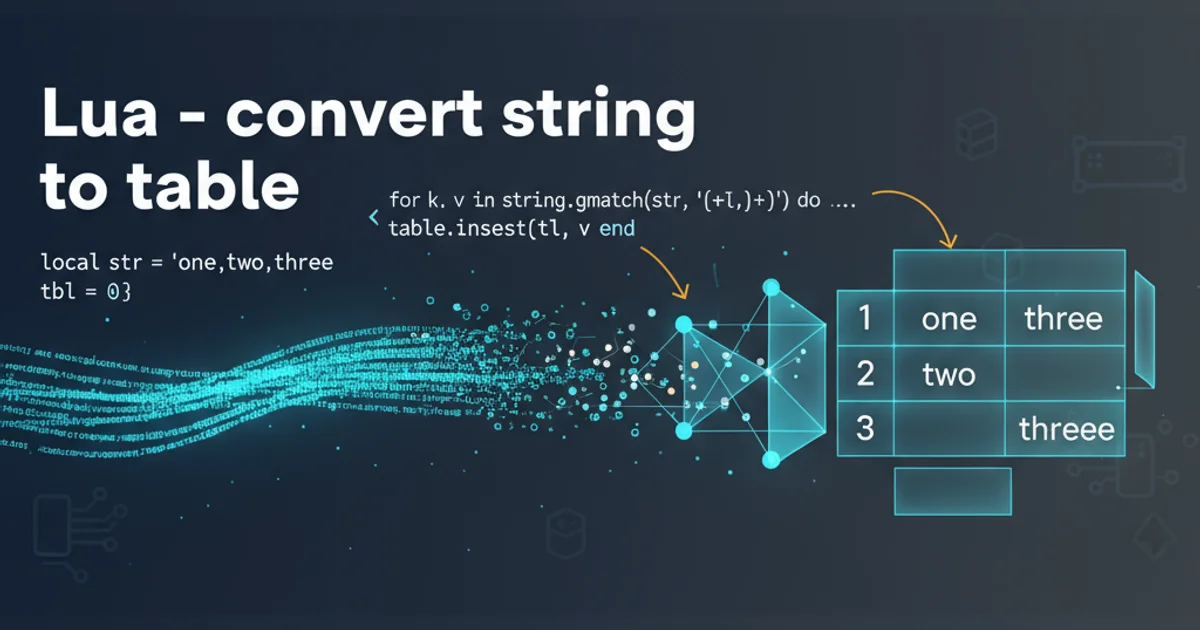Lua - convert string to table
Categories:
Converting Strings to Tables in Lua: A Comprehensive Guide

Learn various techniques to parse and transform string data into structured Lua tables, from simple splitting to complex deserialization.
Lua, known for its simplicity and power, often requires manipulating data in various formats. A common task is converting string data into structured tables, which are Lua's primary data structure. This article explores several methods to achieve this, catering to different string formats and complexity levels. Whether you're parsing CSV-like data, JSON, or custom delimited strings, understanding these techniques is crucial for effective Lua programming.
Basic String Splitting into a Table
The most fundamental conversion involves splitting a string by a delimiter and storing each segment as an element in a new table. Lua's standard library doesn't provide a direct split function, but it's straightforward to implement using string.gmatch or string.find.
function split(inputstr, sep)
if sep == nil then
sep = "%s"
end
local t={}
for str in string.gmatch(inputstr, "([^"..sep.."]+)") do
table.insert(t, str)
end
return t
end
local myString = "apple,banana,orange"
local fruitTable = split(myString, ",")
for i, v in ipairs(fruitTable) do
print(i, v)
end
-- Output:
-- 1\tapple
-- 2\tbanana
-- 3\torange
Implementing a basic string split function using string.gmatch.
string.gmatch function is highly efficient for splitting strings. The pattern ([^"..sep.."]+) captures one or more characters that are NOT the separator. Remember to escape special characters in your separator if it's part of Lua's magic characters (e.g., . + * ? ^ $).flowchart TD
A[Input String] --> B{Define Delimiter}
B --> C{Iterate with string.gmatch}
C --> D{Extract Substring}
D --> E[Add to Table]
E -- Loop until end --> C
C --> F[Return Table]
F --> G[Output Table]Flowchart of the basic string splitting process.
Parsing Key-Value Pairs from a String
Often, strings contain data in a key-value format, such as configuration settings or query parameters. Parsing these into a table where keys are strings and values are their corresponding data requires a slightly more complex approach, typically involving string.gmatch with more specific patterns.
function parseKeyValueString(inputstr, pair_sep, kv_sep)
pair_sep = pair_sep or ";"
kv_sep = kv_sep or "="
local t = {}
for pair in string.gmatch(inputstr, "([^"..pair_sep.."]+)") do
local key, value = string.match(pair, "(.-)" .. kv_sep .. "(.*)")
if key and value then
t[key:gsub("^%s*(.-)%s*$", "%1")] = value:gsub("^%s*(.-)%s*$", "%1") -- Trim whitespace
end
end
return t
end
local configString = "name=John Doe;age=30;city=New York"
local configTable = parseKeyValueString(configString, ";", "=")
for k, v in pairs(configTable) do
print(k, v)
end
-- Output:
-- name\tJohn Doe
-- age\t30
-- city\tNew York
Parsing a string of semicolon-separated key-value pairs into a Lua table.
string.match(pair, "(.-)" .. kv_sep .. "(.*)") pattern is crucial here. (.-) is a non-greedy match for any characters, capturing the key, and (.*) captures the rest as the value. The gsub calls are used to trim leading/trailing whitespace from keys and values.Deserializing JSON Strings to Tables
For more complex, structured data, JSON (JavaScript Object Notation) is a widely used format. Lua does not have built-in JSON parsing, but several excellent third-party libraries are available. dkjson is a popular choice for its simplicity and robustness.
-- Assuming dkjson library is available (e.g., installed via LuaRocks)
-- local json = require("dkjson")
-- For demonstration, we'll simulate a simple JSON parser
-- In a real application, use a library like dkjson or cjson
function simpleJsonParse(jsonString)
-- This is a highly simplified example and will not handle all JSON cases.
-- It's meant to illustrate the concept of deserialization.
-- For production, use a robust JSON library.
local t = {}
-- Remove outer braces and split by comma for key-value pairs
local content = string.match(jsonString, "^%s*\{(.*)\}%s*$")
if not content then return nil end
for pair in string.gmatch(content, "([^{}]+)") do -- Simplified split, needs refinement for nested structures
local key_match, value_match = string.match(pair, '^%s*"([^"]+)"%s*:%s*(.*)$')
if key_match and value_match then
local key = key_match
local value = value_match
-- Attempt to convert value to number or boolean if possible
if value:match("^%d+$") then
value = tonumber(value)
elseif value == "true" then
value = true
elseif value == "false" then
value = false
elseif value:match('^"(.*)"$') then
value = value:match('^"(.*)"$') -- Remove quotes for string values
end
t[key] = value
end
end
return t
end
local jsonString = '{"name": "Alice", "age": 25, "isStudent": true}'
local dataTable = simpleJsonParse(jsonString)
if dataTable then
for k, v in pairs(dataTable) do
print(k, type(v), v)
end
end
-- Expected (with a real JSON parser):
-- name\tstring\tAlice
-- age\tnumber\t25
-- isStudent\tboolean\ttrue
A highly simplified, illustrative example of parsing a flat JSON string. Use a library for real-world JSON.
simpleJsonParse function provided is for conceptual understanding only and will not correctly parse complex or nested JSON. For production environments, always use a battle-tested JSON library like dkjson or cjson for robust and secure JSON deserialization.1. Install a JSON Library (e.g., dkjson)
If you don't have LuaRocks, install it first. Then, open your terminal or command prompt and run: luarocks install dkjson
2. Require the Library in Your Lua Script
At the top of your Lua file, add local json = require("dkjson") to make the library's functions available.
3. Deserialize the JSON String
Use local dataTable = json.decode(jsonString) to convert your JSON string into a Lua table. The library handles all the complexities of JSON syntax.
4. Access Data in the Table
You can now access your data using standard Lua table indexing, e.g., print(dataTable.name) or print(dataTable["age"]).